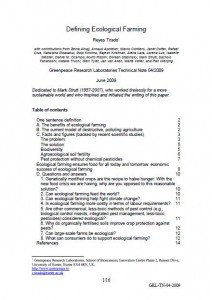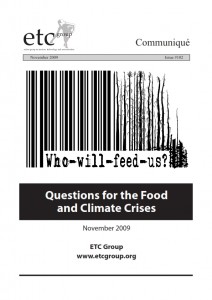Below are links to some reports on food, agriculture and related issues which are useful in the context of agricultural transition. If you know about other reports which you think should be on the list, please use the Submit Report Form or email us at [email protected] .
2017

Who Will Feed Us? The Industrial Food Chain vs the Peasant Food Web
Who Will Feed Us? is a data-driven report full of unexpected statistics that reveal a tale of two food systems. It upturns common assumptions about who feeds whom in a hungry world threatened by climate change.
Some highlights of the report:
- Peasants (not food corporations) feed the world: 70% of the world’s population is fed by the Peasant Food Web, using only 25% of resources.
- Industrial food production fails to feed: Only 24% of the food produced by the Industrial Food
Chain actually reaches people – the rest is wasted in meat production inefficiencies; lost in transport, storage and at the household; and diverted to non-food products. - Industrial food costs us more: For every dollar spent on industrial food, it costs another 2 dollars to clean up the mess
The report is also available in Spanish and French
Category: Reports

Investissements dans l’agriculture durable à petite échelle
Ce rapport de 32 pages donne un aperçu de la situation mondiale des investissements dans l’agriculture. Il fournit des exemples de plusieurs pays et présente des recommandations pour des investissements futurs dans une agriculture durable à petite échelle.
L’objectif du rapport est de:
Augmenter les connaissances, la sensibilisation et les discussions sur les investissements dans l’agriculture durable à petite échelle parmi les organisations d’agriculteurs, les ONG, les institutions et les investisseurs travaillant dans l’agriculture, en particulier dans les pays en développement, ainsi que les décideurs et les institutions des pays de l’OCDE qui s’occupent de l’aide publique au développement (APD).Contribuer à l’augmentation des investissements publics et privés dans l’agriculture durable à petite échelle.
Category: Reports

Unravelling the Food-Health Nexus: Addressing practices, political economy and power relations to build healthier food systems’
This report from the International Panel of Experts on Sustainable Food Systems (IPES) reviews the latest evidence on the whole range of health impacts associated with food systems around the world to provide a full picture. It further examines the political economy of food systems: why evidence gaps persist, why negative impacts are systematically reproduced, and why certain problems are not politically prioritized.
Category: Reports

Women, Agroecology & Gender Equality
This booklet from Focus on the Global South, is intended to serve as a basic background resource for grassroots groups, to make links between gender and agroecology, and to understand agroecology’s potential to address gender inequalities.
Category: Reports

Investments in small-scale sustainable agriculture
This 32 page report gives an overview of the global situation of investments in agriculture. It provides examples from several countries and present recommendations for future investments in small-scale sustainable agriculture.
- The aim of the report is to:
Increase knowledge, awareness and discussions about investments in small-scale sustainable agriculture among farmers’ organizations, NGOs, institutions and investors working in agriculture, especially in developing countries, as well as decision-makers and institutions in OECD-countries dealing with official development assistance (ODA). - Contribute to increased public and private investments in small-scale sustainable agriculture.
Category: Reports

Agroecology and Sustainable Development
This report primarily focuses on agroecology projects and the views of Caritas France’s partners in the Global South. The wide range of practices is tailored to providing local solutions for sustainable agriculture in myriad different regions. All the initiatives are built on the principles of empowerment, action, resilience and integration of the social dimension.
Category: Reports

Report of the Special Rapporteur on the right to food
The report was written by Special Rapporteur on the Right to Food, Hilal Elver, in collaboration with the Special Rapporteur on the implications for human rights of the environmentally sound management and disposal of hazardous substances and wastes. In the report, a clearer account is provided of global pesticide use in agriculture and its impact on human rights; the negative consequences that pesticide practices have had on human health, the environment and society, which are underreported and monitored in the shadow of a prevailing and narrow focus on “food security”, are described; and the environmental and human rights regimes are examined to determine whether the constituent rules are sufficient to protect farm workers, consumers, and vulnerable groups, as well as the natural resources that are necessary to support sustainable food systems.
The report concludes with a set of important recommendations, which include – among the others – a call to the international community to work on a comprehensive binding treaty to regulate and reduce the use of hazardous pesticides taking into account human rights principles, the promotion of agroecology, the development of national action plans that support alternative sustainable practices.
Category: Reports

Ending Hunger: What would it cost?
The International Institute for Sustainable Development (IISD) and the International Food Policy Research Institute (IFPRI) joined forces to estimate what it would cost to end hunger, and the contribution that donors need to make. We consider that a country has achieved this goal when the number of hungry people is less than 5 per cent of the population.
Their findings show the goal is achievable and affordable. We found that it will cost USD 11 billion a year in additional public investment to largely end hunger in developing countries. Donors will need to provide USD 4 billion of the total—which is a 3 per cent increase on current aid levels.
Download report and presentation.
Category: Front Page Item, Reports

The future of food and agriculture: trends and challenges
Are today’s food and agricultural systems capable of meeting the needs of a global population that is projected to reach more than nine billion by midcentury? Can we achieve the required production increases, even if this implies adding pressure to already dwindling land and water resources, and do so in a context of climate change? This publication tries to answer these questions.
What will be needed to realize the vision of a world free from hunger and malnutrition?After shedding light on the nature of the challenges that agriculture and food systems are facing now and throughout the 21st century, the study provides insights into what is at stake and what needs to be done. “Business as usual” is not an option. Major transformations in agricultural systems, rural economies and natural resources management are necessary. The present study was undertaken for the quadrennial review of FAO’s strategic framework and for the preparation of the Organization Medium-Term plan 2018-2021.
Category: Reports

Taking agroecology to scale: the Zero Budget Natural Farming peasant movement in Karnataka, India
This paper analyzes how peasant movements scale up agroecology. It specifically examines Zero Budget Natural Farming (ZBNF), a grassroots peasant agroecology movement in Karnataka, India. ZBNF ends reliance on purchased inputs and loans for farming, positioning itself as a solution to extreme indebtedness and suicides among Indian farmers. The ZBNF movement has achieved massive scale not only because of effective farming practices, but because of a social movement dynamic – motivating members through discourse, mobilizing resources from allies, self-organized pedagogical activities, charismatic and local leadership, and generating a spirit of volunteerism among its members. This paper was produced as part of a self-study process in La Via Campesina, the global peasant movement.
Category: Reports
2016
Fostering Young Professionals to Think Landscapes
From 1-4 December, 2015 Youth in Landscape Initiative workshop at Global Landscape Forum (GLF) in Paris was organized to guide 50 young innovators together to solve rights and tenure, finance and trade, restoration, measuring success, and education challenges. I was one of the 10 young innovators who worked on the Education Theme Landscape Challenge.
Category: Reports

People’s Manual on the Guidelines of Governance of Land, Fisheries and Water
The Voluntary Guidelines on the Responsible Governance of Tenure of Land, Fisheries and Forests in the Context of National Food Security are a new international tool that can be used by peasant, fishing and pastoralist organisations, indigenous peoples, the landless, women, youth, and civil society to assert their rights. This People’s Manual is a didactic guide, which aims to make it easier to understand and use the Guidelines at the best. It is the result of collective and participatory work undertaken by the Land and Territory Working Group of the IPC (International Planning Committee for Food Sovereignty)
Category: Reports

Right to Food and Nutrition Watch
The Right to Food and Nutrition Watch 2016—“Keeping Seeds in Peoples’ Hands”— explores the articulation of seeds, land and other natural resources with the human right to adequate food and nutrition. It assesses the role played by access to and control over natural resources in the realization of the right to food and nutrition across the world. Over the last few decades, the privatization and commoditization of nature has resulted in a multiplication of local struggles using human rights against the appropriation of agricultural biodiversity, land and water resources by corporations and states. How are peasant movements, indigenous peoples, and other local communities resisting—and what are the alternatives they present?
Category: Reports

Connecting Smallholders to Markets
‘Connecting Smallholders to Markets’ is the title of policy recommendations negotiated on 8- 9 June 2016 in the Committee on World Food Security, the foremost inclusive international and intergovernmental platform deliberating on is- sues of food security and nutrition.
This analytical guide examines how small- scale food producers’ organisations and allied civil society can use the recommendations in their national and international advocacy and how they can work together with their governments to apply them in the context of national and regional policies and programmes.More info on the work of CSM on this issue here
Category: Reports
2015
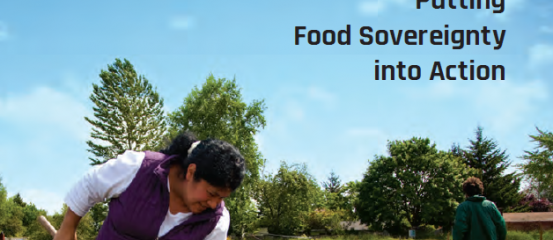
REPORT | Agroecology. Putting food sovereignty into action
Agroecology is an agricultural method based on the traditional knowledge of those who cultivate the land and a way of life. We believe its practice is critical to addressing global hunger and increasing communities’ access to basic resources such as land, water and seeds. The publication is not a technical guide to agroecology, rather it shares the knowledge and perspectives of 10 social movement leaders that are working to “scale up” agroecology around the world. It also highlights the social, political, cultural, nutritional and spiritual meanings of agroecology from within communities that have been negatively impacted by the commodification of food.
Category: Reports
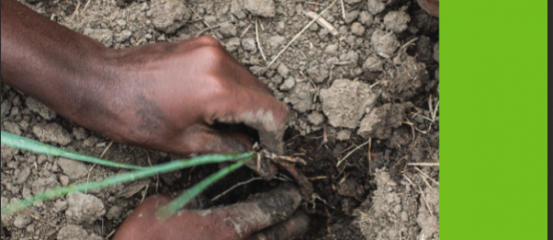
REPORT | Fostering Economic Resilience. The Financial Benefits of Ecological Farming in Kenya and Malawi
The evidence in this report suggests that it is more profitable for small-scale farmers in Africa to practise ecological farming that uses no chemical pesticides or fertilisers than it is to use chemicals. Presenting the results of new fieldwork in Malawi and Kenya, this report shows that farmers practising agroforestry (involving the use of natural ‘fertiliser trees’
instead of chemical fertilisers) and ‘Push-Pull’ technology, which eliminates the need for chemical pesticides) achieve higher incomes and yields than those practising chemical-intensive agriculture.Category: Case Studies and Articles, Reports
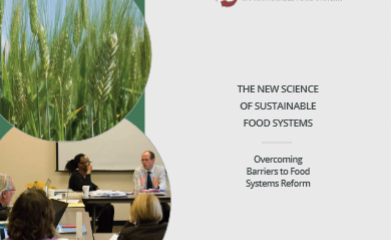
REPORT | The New Science of Sustainable Food Systems
Overcoming barriers to food systems reform.
Despite the mobilization of the political and scientific communities around various food systems issues, the task remains incomplete. There has been a tendency to address the problems as individual pieces of the puzzle, and to overlook the power relations that play a major role in shaping these systems. Read more
Category: Reports
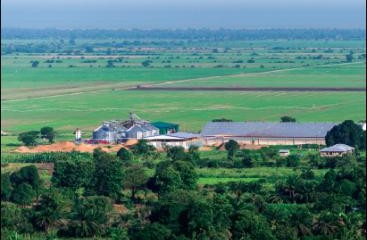
REPORT/Irresponsible Investment: Agrica’s Broken Development Model in Tanzania
Norfund, the UK aid department, and Capricorn are funding the British company Agrica’s industrial rice plantation in Mngeta, Tanzania, which is destroying the livelihoods of smallholder farmers, driving them into debt and impacting the local environment, according to new research by The Oakland Institute released in collaboration with Greenpeace Africa and Global Justice Now.
Agrica’s rice plantation in Tanzania has been used as a showcase project of the G8’s New Alliance for Food Security and Nutrition and the Southern Agriculture Growth Corridor of Tanzania.
The report, Irresponsible Investment – Agrica’s Broken Development Model in Tanzania, documents a catalogue of devastating impacts on local communities.
Category: Reports
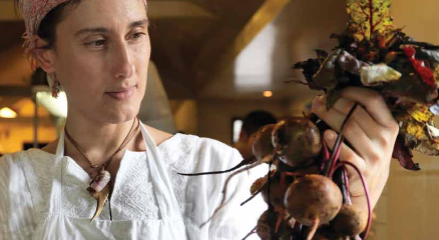
Ecological Farming – The seven principles of a food system that has people at its heart
We are living with a broken food system. It needs to be replaced urgently for the benefit of all people, and the planet. Greenpeace’s Food and Farming Vision describes what Ecological Farming means, and how it can be summarised in seven overarching, interdependent principles – based on a growing body of scientific evidence.
Category: Reports
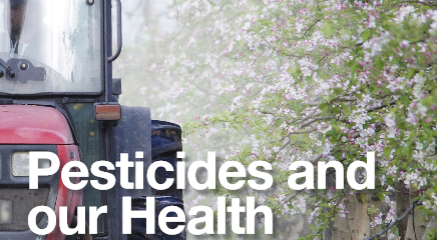
Pesticides and our Health – a growing concern
Extract: The only sure approach to reducing our exposure to toxic pesticides is through a move towards a more long-term and sustainable approach to producing food. This will require legally-binding agreements to immediately phase-out all pesticides that are toxic to non-target organisms implemented at both national and international level.
Fundamentally changing our approach to farming involves a paradigm shift from industrial agriculture, which relies heavily on chemical additives, towards the full implementation of ecological farming as the only means of feeding the population and protecting the ecosystems we live in. Ecological farming is a modern and effective approach to farming that does not rely on toxic chemicals, and delivers healthy and safe food.Category: Reports

Climate Change and the Agriculture Crisis : Agroecology as a Solution
What exactly is the climate change crisis ? How does it affect us ? Are we causing it ? How ? How is it going to affecting our land, water, food and lifestyle ? Can we anything about it ? How ? Why is the practice of agroecology so important in addition to clean energy ?
Should we wait for global agreements on mitigating climate change or act locally, intelligently and consistentl ? Small and marginal farmers must adapt their practices to deal with changing temperatures and more frequent extreme weather events. These adaptations must first and foremost build resilience within the agroecosystem, increasing its ability to continue functioning when faced with unexpected events. How can this be made possible ?
“Climate Change and the Agriculture Crisis – Agroecology as a Solution” throws light on these pressing issues. It is an important addition to our work on small-holder agroecology series of publications. Read the book to understand how agroecology farms hold immense mitigation and adaptation potential and therefore are better suited to deal with the climate crisis.
Category: Reports

Report of the International Forum for Agroecology
“We are pleased to present the report of the International Forum on Agroecology, held at the Nyéléni Center in Sélingué, Mali from 24th to the 27th of February, 2015. This represents the first joint vision of Agroecology from the shared viewpoints of all kinds of small-scale food producing peoples, seen from the perspectives of our social movements. This is the first common statement across constituencies, of the pillars and principles of Agroecology. Read more
Category: Reports

10 principles to guide the transition to sustainable food systems
The International Panel of Experts on Sustainable Food Systems (IPES-Food) has adopted a set of 10 principles to guide the transition to sustainable food systems. The 10 principles include 5 principles to shape the sustainable food systems of the future, and 5 principles for the types of knowledge and analysis that are required to support this transition. Read more
Category: Front Page Item, Reports, Research

Peasant Agroecology for Food Sovereignty and Mother Earth, experiences of La Via Campesina
Our Solutions to the COP21 – New Notebook La Via Campesina – La Via Campesina is pleased to present study booklet number 7: “Peasant Agroecology for Food Sovereignty and Mother Earth, experiences of La Via Campesina”, which is the result of the collective efforts of various organizations from diverse regions including Africa, America, Europe and Asia. These groups make up part of our worldwide movement. From their distinct territories they shaped their experiences in agroecology training, organizing, production and marketing of healthy foods into 10 articles. This set of experiences represents a dynamic range of practices and knowledge, both for training within our movement and as a mechanism for additional knowledge exchange and rural-city dialogue.
This book also seeks to provide visibility of advocacy for Food Sovereignty which creates space for reflection, with examples from academic institutions, political allies and friends. We propose Peasant Agroecology as a way of production for rural communities, where Food Sovereignty constitutes a principle of life.
Category: Reports
2014
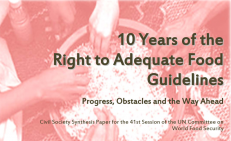
10 Years of the Right To Adequate Food Guidelines
The paper is a product of a broad civil society consultation process, facilitated by the Global Network for the Right to Food and Nutrition.
The paper was intended to be presented at the 41st session of the Committee on World Food Security. Read moreAgroecological research: Conforming – or transforming the dominant agro-food regime?
ABSTRACT
Agroecology has three practical forms—a scientific discipline, an agricultural practice, and a social movement. Their integration has provided a collective-action mode for contesting the dominant agro-food regime and creating alternatives, especially through a linkage with food sovereignty. Read more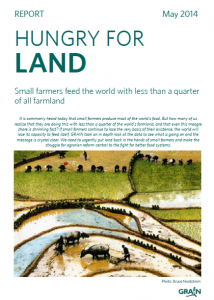
Hungry for land: small farmers feed the world with less than a quarter of all farmland
It is commonly heard today that small farmers produce most of the world’s food. But how many of us realise that they are doing this with less than a quarter of the world’s farmland, and that even this meagre share is shrinking fast? Read more
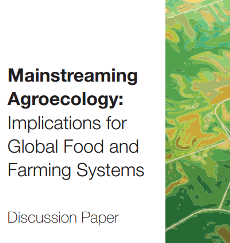
Mainstreaming Agroecology: Implications for Global Food and Farming Systems
The Centre for Agroecology and Food Security (UK) has just released a Discussion Paper on the principles and practices of agroecology and how mainstreaming them can potentially meet the challenges facing agriculture and food production. Read more
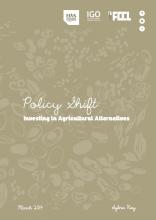
Policy Shift. Investing in Agricultural Aletrnatives
Policy Shift identifies ten key policy changes that are required to support just alternative agriculture investments. The approach integrates human rights into the core of decision-making and is informed by practical, on-the-ground examples of positive agricultural investments that benefit both small-scale farmers and communities.
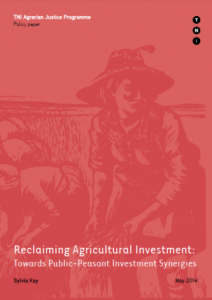
Reclaiming Agricultural Investment
Towards Public-Peasant Investment Synergies
This report argues that there is a need to ‘reboot’ the debate on agricultural investment, away from the narrow corporate centric perspective, towards maximising synergies between public investments and the investments made by small- scale food producers.

Regenerative Organic Agriculture and Climate Change
The white paper, Regenerative Organic Agriculture and Climate Change: A Down-to-Earth Solution to Global Warming, is issued by Rodale Institute, an independent nonprofit agricultural research institute based in the U.S.
It focuses on the regenerative organic agriculture’s role in reversing both climate issues and food insecurity. Read more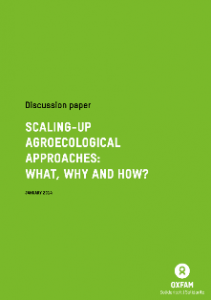
Scaling-up agroecological approaches: what, why and how?
A very useful discussion paper to contribute to ongoing debates on agroecological approaches and their centrality for achieving truly more sustainable agricultural and food systems; to provide key evidence and arguments for supporting advocacy work of CSOs calling for the scaling-up of agroecological approaches in various social and political arenas at national and/or international levels.
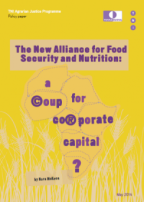
The New Alliance for Food Security and Nutrition. A coup for corporate capital?
This report explores the ways in which global corporations are influencing development agendas in Africa, and the faulty rhetoric that underpins their vision of development. Small farmers produce 80% of the food consumed in Africa today Read more
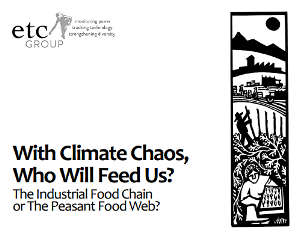
With Climate Chaos, Who Will Feed Us? The Industrial Food Chain or the Peasant Food Web?
This short report compares the industrial food system with peasant farming. Industrial farming gets all the attention (and most of the land). Read more
2013
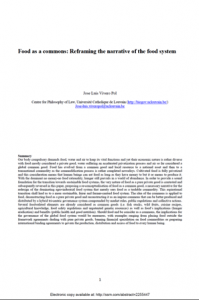
Food as a commons: reframing the narrative of the food system
In this working paper by Jose Luis Vivero*, the very nature of food as a pure private good is contested and subsequently reversed in order to provide a sound foundation for the transition towards sustainable food systems. Read more
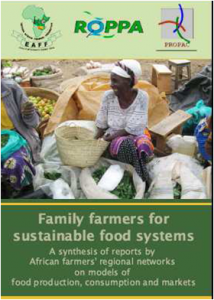
Family Farmers for Sustainable Food Systems
A report from the europeAfrica campaign showing how family farming is the basis for modern food provision in Africa. Read more
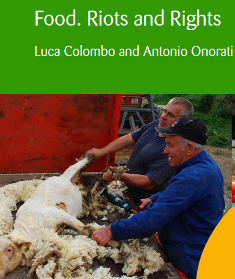
Food. Riots and Rights
The last decade has seen global crises in finance, energy and the economy. But only the prolonged food crisis resulted in riots, reminding us of the historic link between the struggles for food and economic justice. This book, written by Antonio Onorati and Luca Colombo, focuses on the root causes and power games behind the global food crisis and what this means for reforming the global food system.
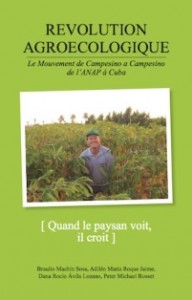
La révolution agroécologique.
Ce livre présente une synthèse de l’expérience paysanne cubaine et les conclusions du travail de systématisation de ce mouvement avant-gardiste, que les organisations paysannes du monde entier peuvent s’approprier et utiliser.
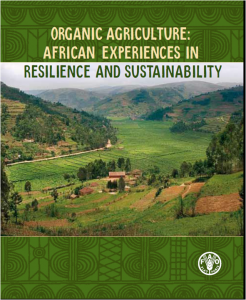
Organic Agriculture: African Experiences in Resilience and Sustainability
This new volume published by FAO tries inspiration from the Conference on Mainstreaming Organic Agriculture in the African Development Agenda held in Lusaka, Zambia in May 2012. It expands on selected research shared during the event and demonstrates that organic management can benefit people, the economy and ecosystems, particularly in Africa.
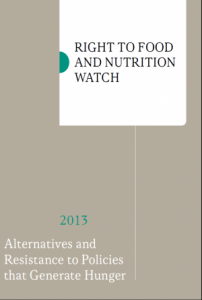
Right To Food and Nutrition Watch 2013
The Report identifies a number of policies that generate hunger and malnutrition instead of reducing them. In response, articles in the report urge that such policies and the actors who implement them, respect and incorporate the human right to adequate food when redesigning detrimental policies
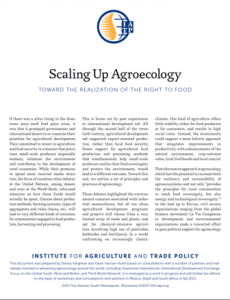
Scaling up agroecology: A tool for policy
For those who see agroecological approaches as necessary for achieving the food, health, and environmental targets of post 2015 agenda, agroecology is not only central to maintaining ecosystem integrity, but also to realizing food sovereigntyof those involved in food production and consumption.
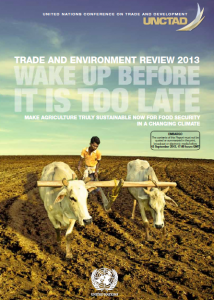
Wake up before it is too late
The report Wake up before it is too late. Make agriculture truly sustainable now for food security in a changing climate has been just released from UNCTAD (United Nations Conference on Trade and Development). Among the key messages, this report clearly states the need for a shift from conventional, monoculture based agriculture towards ecological food production systems.
2012
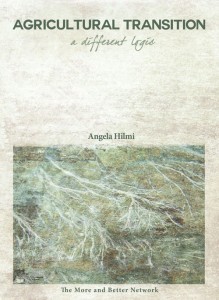
Agricultural Transition
Viable forms of farming exist and evolve in different parts of the world and many transitions are being successful. Twelve steps are proposed, together with their supportive policies to accompany and trigger transitions towards forms of crafting the living world in the rural and the urban that are more adapted to the third millennium.
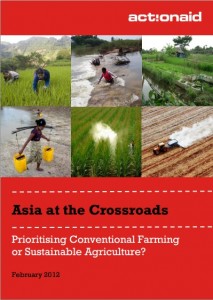
Asia at a Crossroads
This paper seeks to address fundamental questions about the agriculture sector in Southeast Asia and China and to begin to sketch what a way forward – a way towards the “green economy” – may look like.
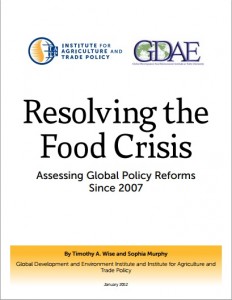
Resolving the Food Crisis Assessing Global Policy Reforms Since 2007
The purpose of the report is to look beyond the proclamations and communiqués to assess what has really changed since the food price crisis erupted.
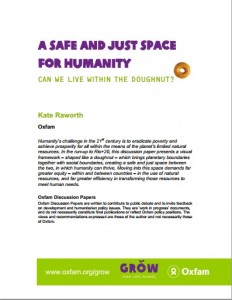
Safe and Just Space for Humanity
This Discussion Paper sets out a visual framework for sustainable development – shaped like a doughnut – by combining the concept of planetary boundaries with the complementary concept of social boundaries.
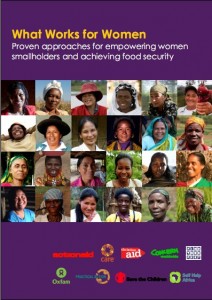
What Works for Women. Proven approaches for empowering women smallholders and achieving food security
What changes do we need to empower women smallholders and achieve food security? The report tries to answer.
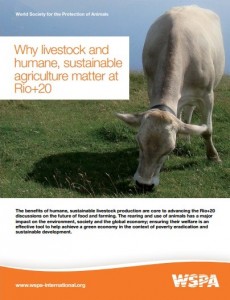
Why livestock and humane, sustainable agriculture matter at Rio+20
The benefits of humane, sustainable livestock production are core to advancing the Rio+20 discussions on the future of food and farming. The rearing and use of animals has a major impact on the environment, society and the global economy; ensuring their welfare is an effective tool to help achieve a green economy in the context of poverty eradication and sustainable development.
2011
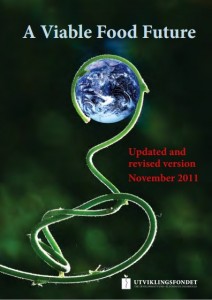
A Viable Food Future, Part I and II
The report give an overview with key facts of both unsustainable and sustainable agriculture, and gives recommendations for how to transform into a viable food future. Part I is in English, Spanish and French. Part II which goes in depth into some issues, is only in English.
Download Links:
Français
Español
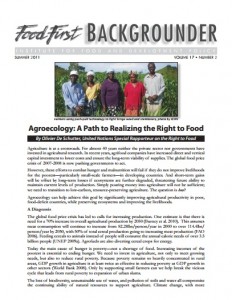
Agroecology: A Path to Realizing the Right to Food
Background paper by Olivier De Schutter, United Nations Special Rapporteur for the Right to Food.
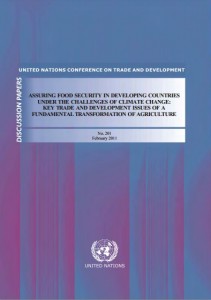
Assuring food security in developing countries under the challenges of climate change: key trade and development issues of a fundamental transformation of agriculture
What is required is a rapid and significant shift from conventional, industrial, monoculture-based and high-external-input dependent production towards mosaics of sustainable production systems that also considerably improve the productivity of small-scale farmers.
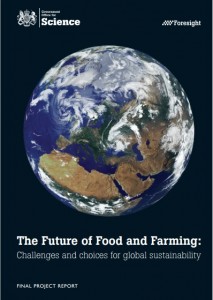
Foresight. The Future of Food and Farming. Final Project Report.
This report is intended for: Policy makers and a wide range of professionals and researchers whose interests relate to all aspects of the global food system: including governance at all scales, food production and processing, the supply chain, and also consumer attitudes and demand.
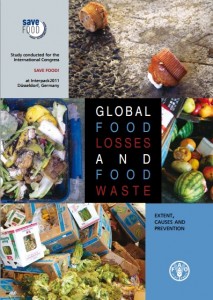
Global Food Losses and Food Waste
The study highlights the losses occurring along the entire food chain, and makes assessments of their magnitude. Further, it identifies causes of food losses and possible ways of preventing them.
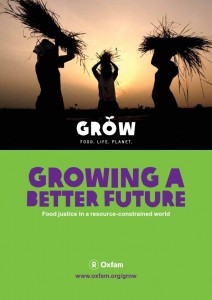
Growing a Better Future Food justice in a resource-constrained world
The report looks into the age of crisis; a skewed and failing system. Based on challenges it looks into the new prosperity and how to grow a better future and a new agricultural future. It also looks at the myths of smallholders, and put forward proposals for a new agricultural investment agenda.
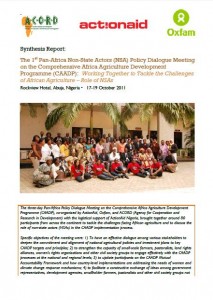
Synthesis Report: The 1st Pan-Africa Non-State Actors (NSA) Policy Dialogue Meeting on the Comprehensive Africa Agriculture Development Programme (CAADP): Working Together to Tackle the Challenges of African Agriculture – Role of NSAs
The report is the result af a dialogue among various stakeholders to deepen the commitment and alignment of national agricultural policies and investment plans to key CAADP targets and principles.
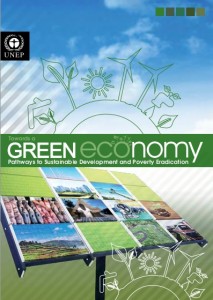
Towards a Green Economy: Pathways to Sustainable Development and Poverty Eradication
Towards a Green Economy is among UNEP’s key
contributions to the Rio+20 process and the overall goal of addressing poverty and delivering a sustainable 21st century.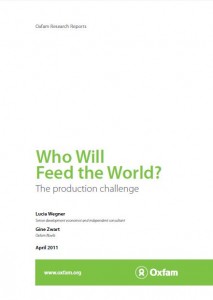
Who Will Feed the World? The production challenge
Against a background of increasing food insecurity, agriculture in developing countries must undergo a significant transformation in order to increase production and respond to climate change. The report tells about why, what kind of changes and policies which are needed.
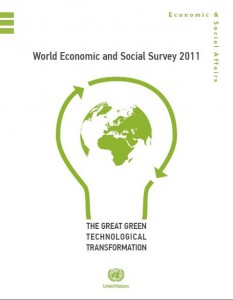
World Economic and Social Survey 2011 The Great Green Technological Transformation
Against a backdrop of a rising global population and unceasing pressure on the natural environment,
the 2011 edition of the World Economic and Social Survey try to give guidance to achieve a much-needed technological transformation to a greener, cleaner global economy.2010
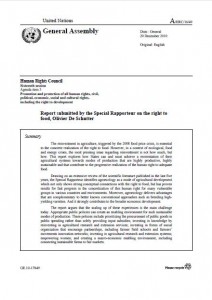
Agroecology and the right to food
The report explores how States can and must achieve a reorientation of their agricultural systems towards modes of production that are highly productive, highly sustainable and that contribute to the progressive realization of the human right to adequate food.
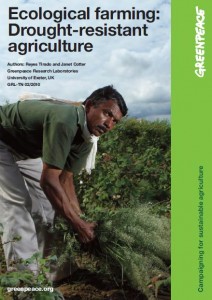
Ecological farming Drought-resistant agriculture
The report explores how farming can be more drought-resistant and more resilient to extreme events.
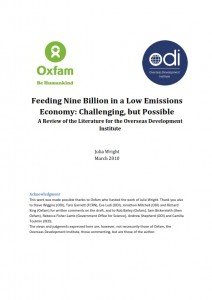
Feeding Nine Billion in a Low Emissions Economy: Challenging, but Possible A Review of the Literature for the Overseas Development Institute
What would agriculture that mitigated climate change, and still fed nine billion in 2005, look
like? What options are there for modifying existing farming systems and developing novel ones? These are the questions this short review of the literature addresses.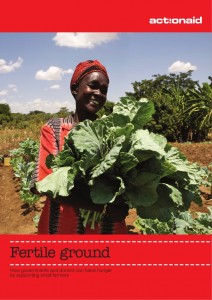
Fertile ground. How governments and donors can halve hunger by supporting small farmers
This report shows that recent budget increases in agriculture stop well short of what is needed to reverse the growing crisis of poverty, environmental degradation and hunger.
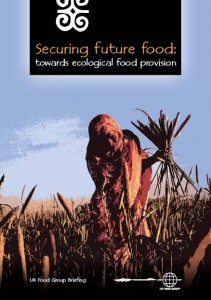
Securing future food: Towards ecological food provision
This UK Food Group Briefing shows why it is necessary to make the radical shift towards ecological food provision in order to secure future food for the world’s predicted 9 billion people.
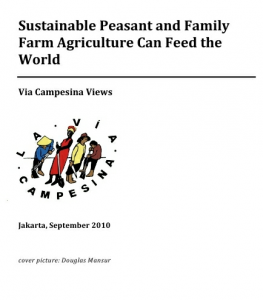
Sustainable Peasant and Family Farm Agriculture Can Feed the World
La Vía Campesina believe that agroecological food production by small farmers is the agricultural model best suited to meeting future food needs. Peasant-based sustainable farming systems based on agroecology and Food Sovereignty offer much hope.
2009
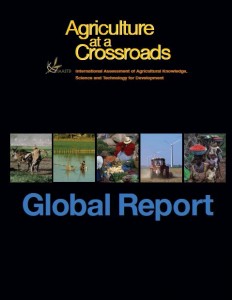
Agriculture at a crossroads. International Assessment of Agricultural Knowledge, Science and Technology for Development
The most comprehensive report published on agriculture:
– Global Report
– Synthesis report
– Executive summary of the synthesis report
– Global summary for decision makers
– Subglobal reports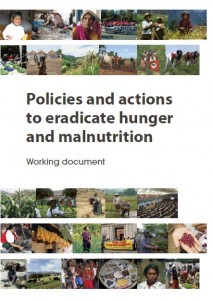
Policies and actions to eradicate hunger and malnutrition
This working document has been drafted by a committee of people from social movements that also integrated input from a broad range of organisations and individuals. About 300 organizations have signed on to the main recommendation in the document.
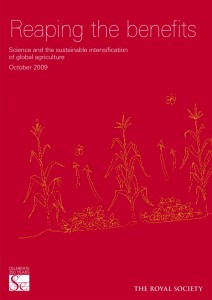
Reaping the benefits: Science and the sustainable intensification of global agriculture
This report discusses the need for a sustainable intensification’ of global agriculture in which yields are increased without adverse environmental impact and without the cultivation of more land.
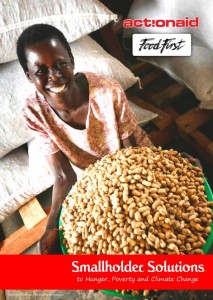
Smallholder Solutions to Hunger, Poverty and Climate Change
Sustainable, smallholder agriculture represents the best option for resolving the fourfold food-finance-fuel and climate crises.
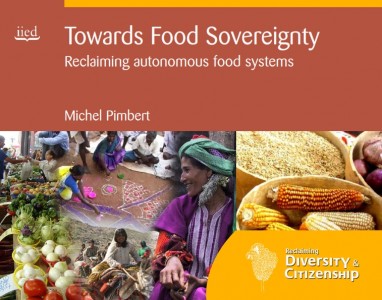
Towards food sovereignty: reclaiming autonomous food systems
Towards Food Sovereignty is an online book with linked video and audio files. The first three chapters, available here, begin to describe the ecological basis of food and agriculture, the social and environmental costs of modern food systems, and the policy reversals needed to democratize food systems.
2008
2007
2006

